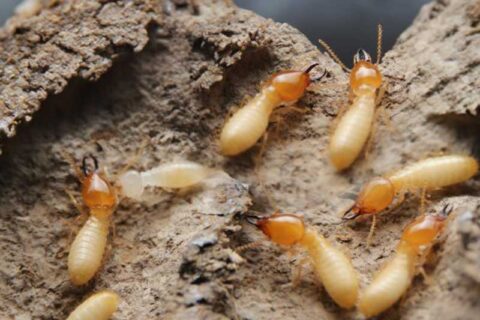The 411 on Spider Bites
Spiders aren’t inherently evil. You might never know it by the panicked reaction they create in many humans, but these arachnids are actually an essential part of our diverse ecosystem. Not only do they contribute to the overall diversity of the planet; they also gobble up insects and even other spiders that might be loitering in your house or backyard. That being said, it’s not all happiness and sunshine as far as spiders are concerned. Unlike termites, spiders won’t eat the foundation of your home, but they might just sink their fangs into your arms or legs. Since many spider bites can cause adverse reactions ranging from the mildly irritating to the medically serious, it’s crucial to enlist the help of a trusty exterminator like MightyMite Termite Services to clear your home or office of these potential threats.
The Most Dangerous Spiders You’ll Encounter
While most spiders are as harmless as flies, others are not so friendly. Some are downright dangerous. So, how do you tell the difference? Which spiders are more scared of you than you should be of them, and which ones will send you to the emergency room?
Poisonous spiders may not constitute the majority of eight-legged creatures, but their venom more than makes up for their small numbers. The United States is home to two species of venomous spiders—the brown recluse and the black widow.
Black Widow Spiders – Black widows are one of the most famous spiders in North America. They’re also one of the most feared. Found primarily in southern Canada, Mexico, and the United States (particularly the Southern and Western states), these venomous arthropods can pack a big punch in a little bite. The females are particularly vicious since they’re far more likely to release a high dose of venom into your bloodstream than the males.
Although black widows are great at getting rid of other pests (they eat everything from mosquitoes and flies to beetles and caterpillars), it’s better to remove them from the vicinity of your home, for your safety and the safety of your entire family.
The good news is that the widow is fairly easy to spot—at least as far as tiny creepy crawlers are concerned. One of its most distinctive traits is a red hourglass-shaped mark on the underbelly of the female. Sometimes the blotch appears in different shapes and colors, such as orange-yellow, but the female always bears some sort of distinctive marking.
Brown Recluse Spiders —As its name suggests, the recluse spider is typically brown. With only six eyes instead of the usual eight, and often featuring a violin-shaped spot on its cephalothorax (the head and thorax area), the recluse has a unique appearance. Its natural habitat is the United States, particularly the region extending from the central Midwestern states to the Southern states.
Since it loves dark and lonely places, the brown recluse is primarily active at night. Typically considered “shy” animals that avoid humans like the plague, these spiders can live without food for months at a time.1 Because of their reclusive habits, these venomous creatures are hard to spot. Many homeowners never even know they have an infestation.
How Do I Know if I’ve Been Bitten?
We’ve all been bitten by a spider at some point in our lives, so recognizing the signs should be easy. Although different types of spiders can cause different types of reactions, there are some basic similarities. Generally, spider bites appear as red and swollen patches on your skin. In many cases, the bite will itch. In most cases, the bite will disappear on its own.
A venomous spider bite, on the other hand, is usually more serious. How serious depends on how much venom was injected into your system and how sensitive your body is to the toxins. Since both the brown recluse and the black widow can cause serious complications, it’s important to be able to recognize the signs so you can identify a dangerous bite as quickly as possible.
Black Widow Bite Symptoms— While many people experience little more than slight pain accompanied by swelling and redness around the area of the bite, others develop a severe reaction that requires medical care. Although black widows can cause a great deal of pain and discomfort, their bite is rarely fatal.
Here are tell-tale signs of a widow bite:
- Target-shaped rash around the bite
- Swelling or redness in the affected area
- Cramps or spasms that begin in the area surrounding the bite, and then spread to other areas
- Severe pains in the chest, abdomen, or back
- Shortness of breath
- Sweating
- Headache
- Nausea and/or vomiting
- Rapid heartbeat
- High blood pressure2
Brown Recluse Bite Symptoms— Although the bite of the brown recluse is unintentional, it is often incredibly dangerous. As with a black widow bite, reactions can range from nearly non-existent to permanently damaging. In fact, the Integrated Pest Management Program at UC Berkeley reports at up to 90 percent of brown recluse bites heal on their own with no scarring.
For many people who are part of the unlucky 10 percent, however, the repercussions can be severe. The worst complication is the onset of gangrene, which destroys the surrounding tissue and often requires surgery.
The following symptoms sometimes occur in people who have been bitten by a brown recluse spider:
- Fever
- Chills
- Sweating
- Itching
- Nausea
- Severe pain
- A small white blister that turns into a blue-gray or blue-white lesion
I’ve Been Bitten! What Should I Do?
How you should react to a bite depends on what kind of spider has done the biting. In the vast majority of cases, the bite will disappear on its own. If the itching is bothersome, you can always apply some anti-itching cream to the bite. It’s also useful to ice the affected area for up to 10 minutes at a time. Otherwise, the symptoms will fade away after a few days.
If you experience any of the symptoms listed above, however, and are worried you might have gotten bitten by a black widow or brown recluse, it’s best to do the following:
Seek medical attention immediately— Call your physician or local hospital as soon as possible. You may also want to try the California poison control center at 1-800-222-1222 (search online for your local poison control center if you live elsewhere) in order to get expert advice on what further steps to take.
Ice— Grab an ice pack and apply it directly to the bite. In addition to numbing the pain, it might decrease swelling.
Don’t panic— The best thing you can do while you’re waiting to hear back from your physician is to remain calm and stay as still as possible. Failing to do so may raise your blood pressure and heart rate even more, which will only increase the flow of venom throughout your circulatory system.
The Spiders Lurking in Your Home
Different spiders tend to hang out in different environments. Each has its favorite type of hiding spot. Both black widows and brown recluses, for example, prefer dark places far away from the prying eyes of humans.
You may run into either type of spider in a diverse set of dark and dry locations in or near your home, such as:
- Garages
- Closets
- Baths
- Cellars
- Vents
- Boxes
- Corners
- Vegetation
Mightymite Termite Services to the Rescue
Worried you might have an infestation of dangerous spiders? MightyMite Pest Control can help. No matter what type of dangerous creatures you’re worried about, our team of professional pest control experts is equipped to deal with the problem. We offer services that include everything from termite inspection and treatment to rodent control for residents in California’s Bay Area.
Fill out the form at the bottom of our treatment page to schedule a free pest or termite inspection. You’ll be glad you called!








